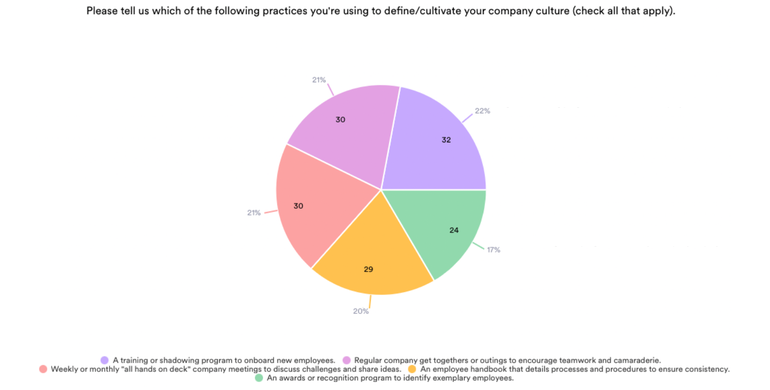5 Ways Power Players Create Lasting Company Culture
From training to awards to just having fun, here are the strategies the most successful roofing and exteriors companies use to indoctrinate new workers while challenging and maintaining existing ones.
November 29, 2022

Sponsored by SRS Distribution
Ask any successful contractor what their secret sauce is, and they'll probably point to their employees. But dig a little deeper, and you'll find out that while those employees are vital, what's more important is that they're all on the same page regarding values, goals and overall consistent level of service.
In other words, those employees are part of a strong company culture that indoctrinates new workers into the firm's ethos while challenging and celebrating existing workers. In this category, Power Players excel, with 62% naming this company strength as key to their success.
"We maintain our company culture by constantly valuing all employees and making sure that everyone on the team is a part of the innovation and growth of our company," said Aiden Winn, president of Renner Roofing Inc., echoing what many Power Players said. "We maintain family values both with our employees and our customers, no matter who we are working with or where we are working."

Of course, doing so is easier said than done. So just how do Power Players create and maintain their company culture?
Here are five core strategies they use that all companies can emulate.
1. A training or shadowing program to onboard new employees
Of those Power Players who named culture creating a company strength, 100% said this strategy was key. That's because new employees are often the weakest link in maintaining a strong and consistent company culture. That starts with an established onboarding process, as evidenced by Corey Construction.
"Our mission is to build people up to succeed. In order to do so, we have a shadowing/mentoring program. As part of our onboarding process, we provide mentoring/shadowing so that new employees may learn and benefit from others' experience, knowledge and connections," said Dana Broom, the company's marketing director.
Other companies, such as Above Roofing, require certain standards before new hires are allowed to join the team.
"When onboarding new sales and production team members, they must become MSA certified and even complete hands-on training by working on a mock roof," said Devon Hudson, the company's marketing specialist. "They also ride along with established and experienced employees for a few weeks to gain additional field exposure and experience to maintain the integrity of Above Roofing's standards."
2. "All hands on deck" company meetings to discuss challenges and share ideas
Regular meetings were the second-most-popular method for creating and maintaining company culture, encompassing 94% of Power Players in this category.
But making such meetings a core part of company culture requires more than just setting a time and place for them to happen.
Rackley Roofing offers a good example of how sharing ideas can cover all aspects of work. It even includes it in one of its core values: innovation. "Introducing new, creative ideas is how we change the industry. We promote thinking outside the box and are fully open to change," the company's value states.
"Our team meets weekly, monthly and quarterly to ensure that together we have one vision, one mission, and that is to change the world, one roof at a time," added Michele Boykin, the company's CFO.
Often the key to companywide meetings is encouraging an atmosphere of transparency and openness. Two good examples of doing this are Advanced Roofing & Construction and Allied Exteriors.
"Advanced is implementing companywide meetings to bring to light any concerns, needs, thoughts or input that anyone may have in order to encourage a supportive, honest and transparent environment," said Brandon Foote, the company's president.
"We host weekly meetings every Monday to discuss what is working well, what needs improvement, and how our clients are doing," said Melanie Smith, Allied Exteriors' executive assistant.
3. Regular company outings and get-togethers to encourage teamwork and camaraderie.
The best company cultures are those that include some fun in the mix. That's where gatherings outside of work can come in. This practice goes hand-in-hand with regular company meetings, tying in popularity with that strategy. And the types of outings are as varied as the companies themselves. Here are a few examples:
"Understanding and aligning our values together helps maintain our positive culture," said Saori Yamashita, Superior Roofing's sales and marketing manager. "We often provide lunch in groups, celebrating holidays such as administration day, Labor Day and girls' day. We ask employees to bring food to celebrate the holidays. We celebrate birthdays every month. We provide for and attend baseball games, holiday parties, vendor events, etc."
CMR Construction & Roofing combines its company brand with the types of outings it offers employees. "We have always said that our team is the engine that drives our success," said Melis Steiner, the company's creative director, adding: "CMR holds exciting company events almost weekly through our motorsports sponsorships. Our teams gather at the various races with first-class access to VIP suites, pit passes and our fantastic tailgating area. These are just a few ways that we support a robust company culture and set the foundation for success year-round."
4. An employee handbook that details processes and procedures to ensure consistency.
Employee handbooks are one of the most basic ways to not only maintain company culture but also provide a way for management to set expectations. More than 90% of Power Players in this category use this strategy, and it often encompasses a wide range of company culture aspects, including safety.
But ultimately, it's about providing a foundation for success.
"CTR has developed detailed human resource policies and procedures to ensure that all staff members receive the training, resources, and support they need to succeed," said Wendy Dishman, Cross Timbers Roofing controller. "Our company employee handbook and equally important safety manual are thorough and detailed and receive regular review with timely revisions on a set schedule."
Legacy Roofing echoes that sentiment.
"This is a family-oriented business with a robust training center and mirroring program for all new employees," said company owner Josh Carrion. "We have an awesome 30-page handbook that outlines our core values, company mission, policies and procedures, as well as our [injury and illness prevention program] and safety program."
5. An award or a recognition program to identify and celebrate exemplary employees.
The fewest Power Players employ this strategy for culture creation, with only 75% naming it. But those who do find that it's not just a powerful way to transmit company values but also a key to identifying and encouraging future leaders.
Roofing Solutions provides an excellent example of this strategy in action, using training as a way to help "employees mirror the same energy, passion and drive of the company."
"The project team leaders at Roofing Solutions act more like coaches than managers," explained Tupac De La Cruz, company owner and founder. "Roofing Solutions … offers a tuition-reimbursement program to employees who choose to pursue advanced degrees, and 90% of its employees have been certified in Steven Covey's "Seven Habits of Highly Effective People" program.
While many companies create internal awards programs, Tecta America uses existing award programs to highlight its star employees.
"We want to continue to invest in our employees and empower them to achieve their goals. We also nominate our employees for industry achievements," said Cat Engleby, the company's marketing manager. "The current NRCA Roofing Alliance MVP and Best of the Best Winner, Dennis Dudek, is our superintendent from Tecta America Southeast. We couldn't be prouder of Dennis. He leads his team by example at work and off the clock. He is a true representation of Tecta America."
Read more about:
Power PlayersAbout the Author(s)
You May Also Like




